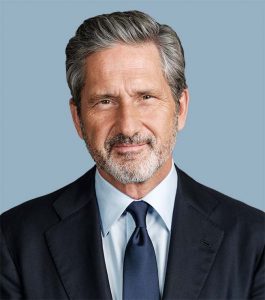
After more than 40 years of operation, DTVE is closing its doors and our website will no longer be updated daily. Thank you for all of your support.
Liberty Global’s Fries: fibre makes more sense than DOCSIS upgrades
Investing in fibre makes more sense across most of Europe than upgrading HFC networks to DOCSIS 4.0, according to Liberty Global CEO Mike Fries.

Mike Fries
Speaking at the end of the Goldman Sachs European Communacopia virtual conference, Fries said that costs of building fibre in the UK, for example, were comparable to upgrading legacy infrastructure.
“Fibre makes a lot of sense in Europe. It doesn’t make a lot of sense in the US,” he said, related to cost of build, density and opportunities for wholesale revenue.
Liberty Global’s rollout of fibre in the UK is proceeding “at a very reasonable cost” of around £100 a home, not much more than an upgrade to DOCSIS 4.0, said Fries.
He said Liberty was also extending its network and would have “four to five million fibre homes” this year from a combination of upgrades and expansion.
He said Telenet in Belgium was different in creating the Wyre netco, which had “started out life with a great utilization rate”.
Fries said LG looks at the competitive environment, the market structure – whether there is a wholesale business – and the cost of build in each market before deciding whether to upgrade to fibre.
That means the choice may be different in certain markets.
In Switzerland, he said, there are only two fixed network and upgrade to fibre is expensive, with limited wholesale.
In the Netherlands, he said, there are two networks with KPN building fibre and VodafoneZiggo delivering 1Gpbs over DOCSIS 3.1. He said the company “feels good about DOCSIS 3.1 and 4.0” but added that it has options in that market.
He said that KPN’s fibre build was “not driving share-shift” in the Netherlands. Competition was about price and service quality, he said. “It is a competitive market and you have to differentiate yourself,” he said.
On the recent acquisition of a fibre alt net, he said that he believed LG had paid about half of what the company’s investors had put in. “The market is challenged. Some people will stick it out but rationalization is inevitable and we will be part of that,” he said.
Fries said because VMO2 was building out at scale, it was able to negotiate good rates with suppliers.
He said the case for upgrading from DOCSIS 3.1 to fibre on Virgin Media’s own net had not been based on a wholesale case. However, the JV with Telefónica in InfraVia was 100% wholesale based with VMO2 as the anchor customer.
Rational markets
Turning to the future of assets outside the UK, on the future of VodafoneZiggo in the Netherlands, Fries said that VodafoneZiggo had been “a textbook case” of convergence and said that “the market is more rational than people realise”.
He said discussion were taking place “about where we are going” and added that “all options are on the table” for the future of the company. However, he decline to give an indication on a timing of any decision.
On the decision to take Telenet private in Belgium, Fries said that the market had “some real interesting infrastructure elements and some risk – it’s a mature market. I understand why some would exit [but] the core business is strong”. He said taking Telenet private would give the company flexibility.
On mobile, Fries said “the underlying growth case is as good as I’ve seen it”. Most markets were “three-player markets” except for the UK, where the Vodafone-Three merger is pending. Fries said he expected that deal would probably go through.
“Four versus three networks doesn’t make it any different for consumers in my opinion,” he said.
On rising interest rates, Fries said LG was not currently impacted. If rates stay high for the next four to five years, it would have to act.
He added that local listings and investment meant that the view of local players had to be taken into account.
“We can look at leverage on a case-by-case basis and that is what we will do,” he said.
He said that LG will have bought back close to 15% of its shares from 2017 levels by the end of this year. If the company listed or disposed of assets in different markets, this programme would significantly pay off, he said.
On Liberty Global Ventures’ media assets, he said a lot of those were “legacy assets” while infrastructure investments were “exciting”.
Valuation gap
Commenting on a familiar theme, Fries said that the value of Liberty Global’s infrastructure and customer base had been proven over the years by the values realized on disposal of assets, but the gap between those valuations and the value of the publicly listed company remained.
“Our infrastructure assets are gold,” said Fries, adding that to reduce the gap in valuation the company needed to focus on its core business plan, focus on local listings and look at M&A opportunities.
On Liberty Global’s redomiciling to Bermuda, Fries said that it was “a good time to lean into our stock”. He said the company had simplified its portfolio to five core markets that are rational and where it is the primary challenger brand.
“We have a platform…to really do creative things. I think it will really create opportunity for us…to really shrink the gap…for the benefit of shareholders through various financial means all of which are going to be easier to execute,” he said.


